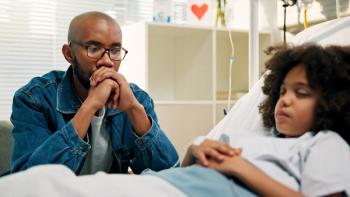
- March 2017
- Volume 12
- Issue 2
Seeing Cancer Through a Sibling's Eyes: What We Don't Know Can Hurt Them
From the University of Pennsylvania School of Nursing: Healthy siblings of children with cancer should not be overlooked in family-centered care.
Kim Mooney-Doyle is a lecturer at the University of Pennsylvania School of Nursing.
Family-centered care is crucial to the care of children with cancer, whose disease and treatment are both life-threatening and often prolonged over the course of several years, through survivorship or until death.1 Family-centered care recognizes the stark reality that cancer is disruptive to the family system.
While acknowledging the value of family-centered care to the ill child and parents in clinical practice, we may overlook other family members who would also benefit from family-centered care, most notably the healthy siblings of the child with cancer. Indeed, healthy siblings have described wanting more information about their ill brother or sister and the illness2; parents have described wanting guidance on how to best meet the needs of the siblings when one child has advanced cancer3 and to do so across the spectrum of life-threatening illness.4
Challenges associated with a cancer diagnosis, treatment, and adaptation impact the entire family. Recent research has demonstrated that families experience altered family function and may face an accumulation of risk over the course of illness,5,6 whereas other research reports that the experience of cancer increases family cohesion7 and family resilience.8
THROUGH THE SIBLING’S EYES
Perceptions of the impact of cancer on the family often come from the parental perspective. However, recent research revealed worse agreement in parent—sibling pairs, regarding social and emotional health-related quality of life compared with parent–cancer survivor pairs.9
Such findings remind us that each member of a family will assess the impact of the illness differently, and there may be limits to proxy-reporting. In a recent qualitative synthesis, Woodgate and colleagues found that parents across studies perceived siblings experienced feelings of jealousy, neglect, and bitterness.10 Yet, “while a few worked to counterbalance negative feelings in the siblings, a few rejected impartiality” 10 regarding the distribution of parent time and attention because of the illness.
In this same meta-synthesis, parents also reported changes in relationships with all of their children; although they reported more intense relationships with the brain tumor survivor, parents described a more distant relationship with their healthy children, which they ascribed to increasing independence in the healthy children. Taken together, we see that families experience increasing stressors in the face of a beloved child’s cancer.
This cumulative stress, including the caregiving demands of the illness, may prompt misaligned views of the illness’s impact on the family and its individual members; parents and healthy siblings may not agree on the extent and nature of illness-related effects on the family and individual members. When a child is diagnosed with cancer, the whole family is disrupted; more “whole-family” research is needed to elucidate these siblings’ everyday experiences.
As pediatric nurses, we need to be concerned about these siblings. Recent research suggests that siblings experience both positive and negative effects related to the experience of having a brother or sister with cancer.
Alderfer and colleagues11 demonstrated that whereas most healthy siblings weather the cancer experience, some experience anxiety, depression, or other psychopathology. Overall, many healthy siblings reported feelings of fear, isolation, anger, guilt, and sadness. Another study found that siblings experience elevated cancer-related traumatic stress that interferes with daily functioning.12 For example, siblings of children with cancer experience negative changes in school performance when compared with their peers13 or norms.14 In addition, healthy siblings were found to miss as much school as their brother or sister with cancer, nearly twice that of their healthy peers.15
In quantitative studies, siblings of children with cancer did not demonstrate worse social functioning or relationships than their peers.13 In qualitative studies, however, affected siblings have described disrupted friendships and less time in favorite extracurricular activities.16 Thus, although siblings experience a variety of reactions across the various domains of their lives, more research is necessary to probe into the nature and ramifications of these reactions from the siblings’ perspective.
Bereaved siblings have a great deal to teach us. Recent evidence demonstrates that long-term psychological sibling health may be related to communication around their brother or sister’s death.17 Siblings who were afraid of getting in the way of healthcare providers reported greater anxiety 2 through 9 years after the death. This same group found insufficient communication within the family around illness was related to long-term sibling psychological health. Other research in siblings of children receiving stem cell transplant has shown that do not perceive they receive adequate communication.2
Recent research has also demonstrated that adolescent siblings of children with various life-threatening and life-limiting illnesses might avoid talking to their parents because they are hesitant to bother them with problems. Adolescent siblings may recognize the threat to their sibling’s life and appreciate that their parents are stressed. On the other hand, parents want their healthy children to know they are loved and want to keep their lives as normal as possible.4
THE NURSE’S ROLE
Nurses can promote a broadened scope of family-centered care and recognition of sibling needs in advanced disease and other times of turmoil. In doing so, we may mitigate some negative effects of strained or limited communication. Oncology nurses directly impact families through communication and can model open, compassionate, developmentally appropriate communication with siblings.
Moreover, coaching and teaching are inherent to nursing care of families. Thus, our role can be 2-fold: communicating with siblings across settings to increase their comfort or to provide education and coaching to parents in discussing sensitive, emotional topics related to the illness. Teaching parents to keep lines of communication open across the various fronts on which they parent all their children recognizes the intensity of their work and can promote family function and child outcomes at a time when both might be vulnerable.10, 18
______________________________________________________________________________
References
1. Ogle SK. Clinical application of family management styles to families of children with cancer. J Pediatr Oncol Nurs. 2006;23(1):28-31.
2. Pentz RD, Alderfer MA, Pelletier W, et al. Unmet needs of siblings of pediatric stem cell transplant recipients. Pediatrics. 2014;133(5):e1156-62.
3. Monterosso L, Kristjanson L, Phillips M. The supportive and palliative care needs of Australian families of children who die from cancer. Palliat Med. 2009;23(6):526-536.
4. Mooney-Doyle K, Deatrick JA. Parenting in the face of childhood life-threatening conditions: The ordinary in the context of the extraordinary. Palliat and Support Care. 2016;14(03):187-198.
5. Long KA, Marsland AL. Family adjustment to childhood cancer: A systematic review. Clin Child Fam Psychol Rev. 2011;14(1):57-88.
6. Long KA, Alderfer MA, Ewing LJ, Marsland AL. The role of contextual threat in predicting self-reported distress among siblings of children with cancer. J Clin Psychol Med Settings. 2013;20(2):199-208.
7. Beek L, Schappin R, Gooskens R, Huisman J, Jongmans M. Surviving a brain tumor in childhood: Impact on family functioning in adolescence. Psycho‐Oncology. 2015;24(1):89-94.
8. Van Schoors M, Caes L, Verhofstadt LL, Goubert L, Alderfer MA. Systematic review: Family resilience after pediatric cancer diagnosis. J Pediatr Psychol. 2015;40(9):856-868.
9. Schulte F, Wurz A, Reynolds K, Strother D, Dewey D. Quality of life in survivors of pediatric cancer and their siblings: The consensus between Parent‐Proxy and Self‐Reports. Pediatr Blood Cancer. 2016;63(4):677-683.
10. Woodgate RL, Tailor K, Yanofsky R, Vanan MI. Childhood brain cancer and its psychosocial impact on survivors and their parents: A qualitative thematic synthesis. Eur J Oncol Nurs. 2016;20:140-149.
11. Alderfer MA, Long KA, Lown EA, et al. Psychosocial adjustment of siblings of children with cancer: A systematic review. Psycho‐Oncology. 2010;19(8):789-805.
12. Kaplan LM, Kaal KJ, Bradley L, Alderfer MA. Cancer-related traumatic stress reactions in siblings of children with cancer. Fam Syst Health. 2013;31(2):205.
13. Alderfer MA, Stanley C, Conroy R, et al. The social functioning of siblings of children with cancer: A multi-informant investigation. J Pediatr Psychol. 2015;40(3):309-319.
14. Labay LE, Walco GA. Brief report: Empathy and psychological adjustment in siblings of children with cancer. J Pediatr Psychol. 2004;29(4):309-314.
15. French AE, Tsangaris E, Barrera M, et al. School attendance in childhood cancer survivors and their siblings. J Pediatr. 2013;162(1):160-165.
16. Samson K, Rourke MT, Alderfer MA. A qualitative analysis of the impact of childhood cancer on the lives of siblings at school, in extracurricular activities, and with friends. Clinical Practice in Pediatric Psychology. 2016;4(4):362.
17. Wallin AE, Steineck G, Nyberg T, Kreicbergs U. Insufficient communication and anxiety in cancer-bereaved siblings: A nationwide long-term follow-up. Palliat and Support Care. 2016;14(5):488-494.
18. Whiting M. Impact, meaning and need for help and support: The experience of parents caring for children with disabilities, life-limiting/life-threatening illness or technology dependence. J Child Health Care. 2013;17(1):92-108.
Articles in this issue
almost 9 years ago
Novel Immunotherapy Under Study in Pancreatic Canceralmost 9 years ago
The Shoe Is on the Other Foot When the Nurse Has Canceralmost 9 years ago
Attitude Shift: Making Safe Handling of Hazardous Drugs a Priorityalmost 9 years ago
Brain Trust: Research Accelerated to Improve GBM Survivalalmost 9 years ago
It's All About Leadership and Teamworkalmost 9 years ago
Lateral Violence in Nursing Can Take Many Formsalmost 9 years ago
Can You Navigate Our Horses Out of the Parking Lot?almost 9 years ago
Cervical Cancer: New Data on Survivalalmost 9 years ago
Zero Tolerance: Stopping Nurse Bullying Begins With Leadershipalmost 9 years ago
Fast Facts for the Frontline: Ostomy CareNewsletter
Knowledge is power. Don’t miss the most recent breakthroughs in cancer care.
























































































